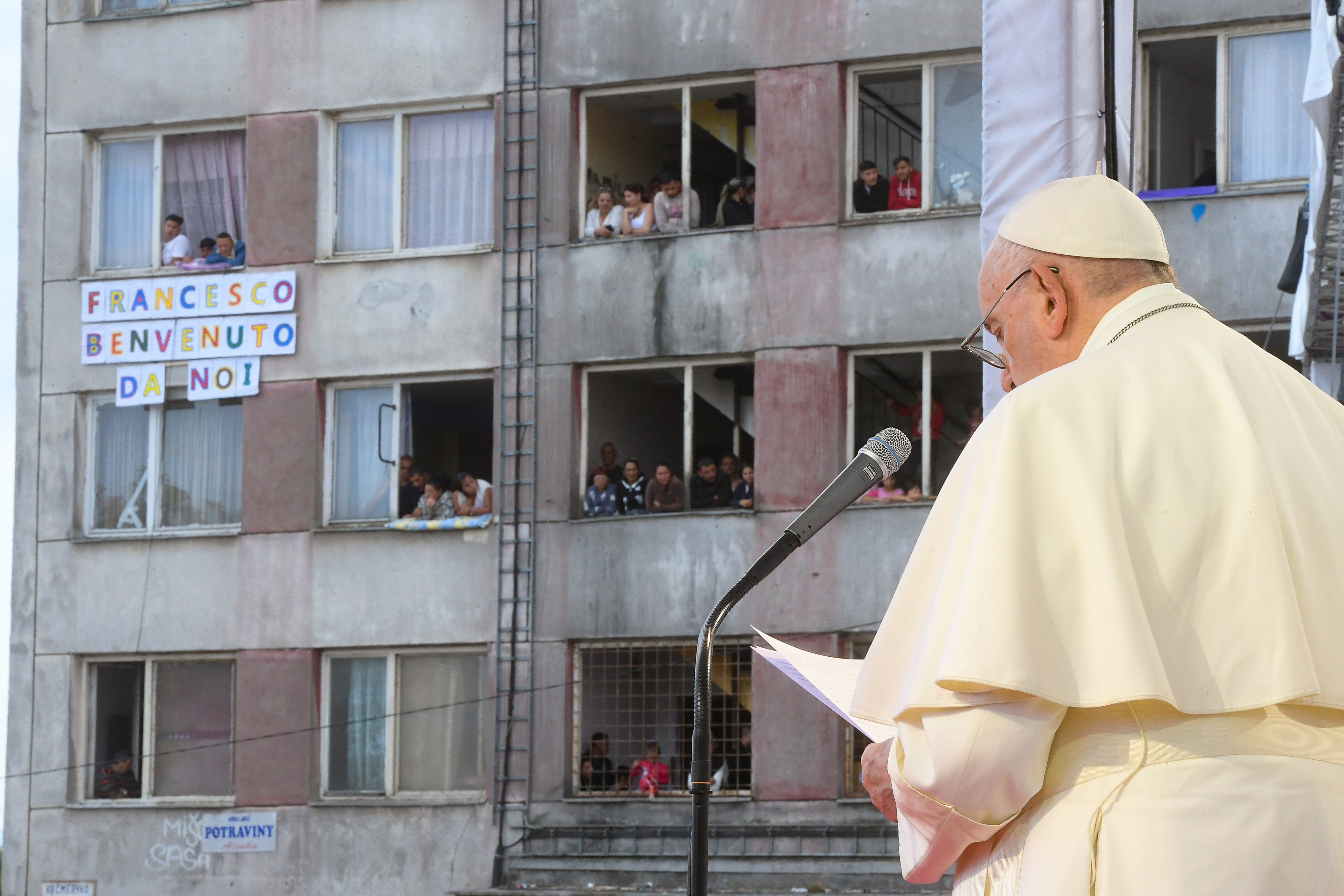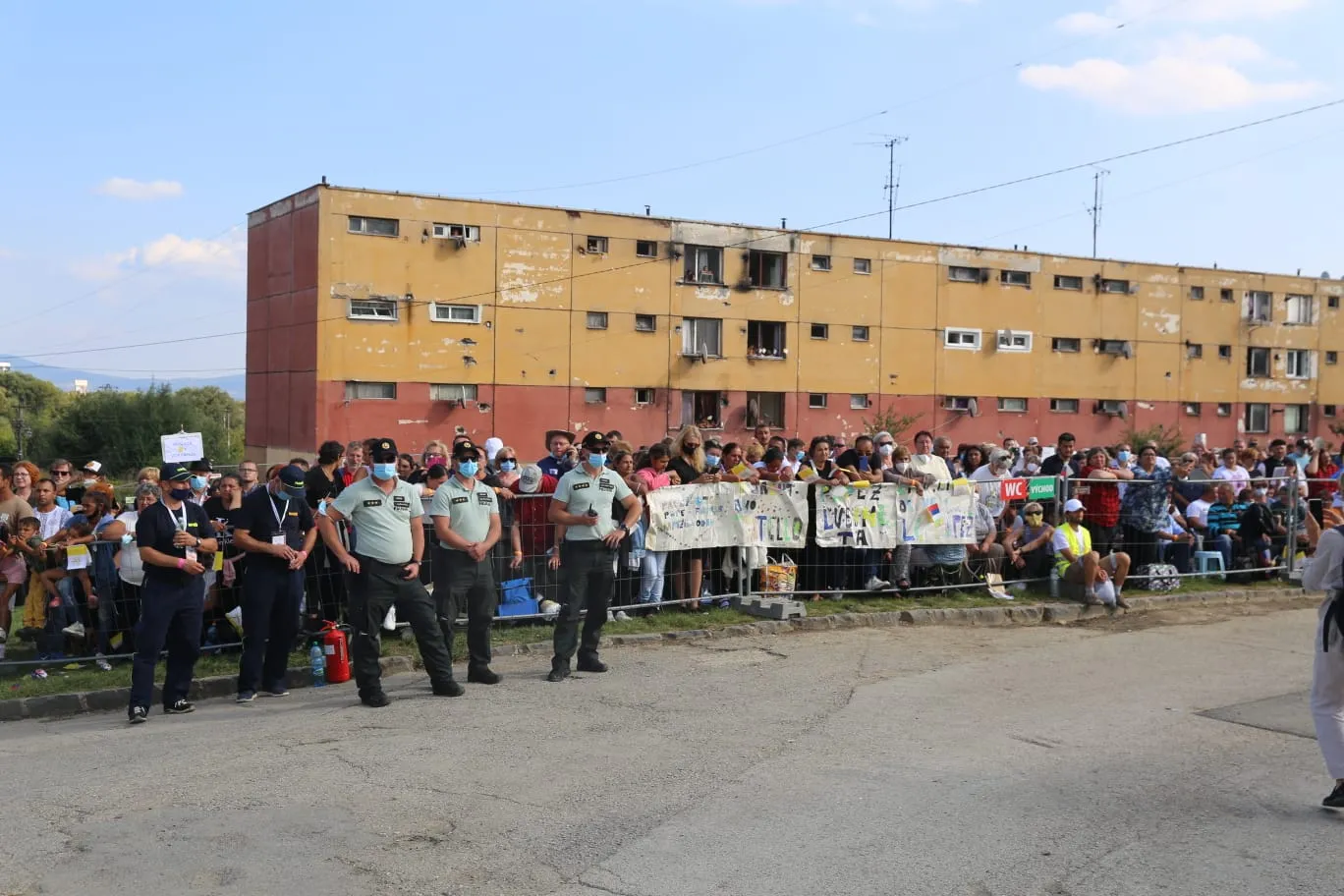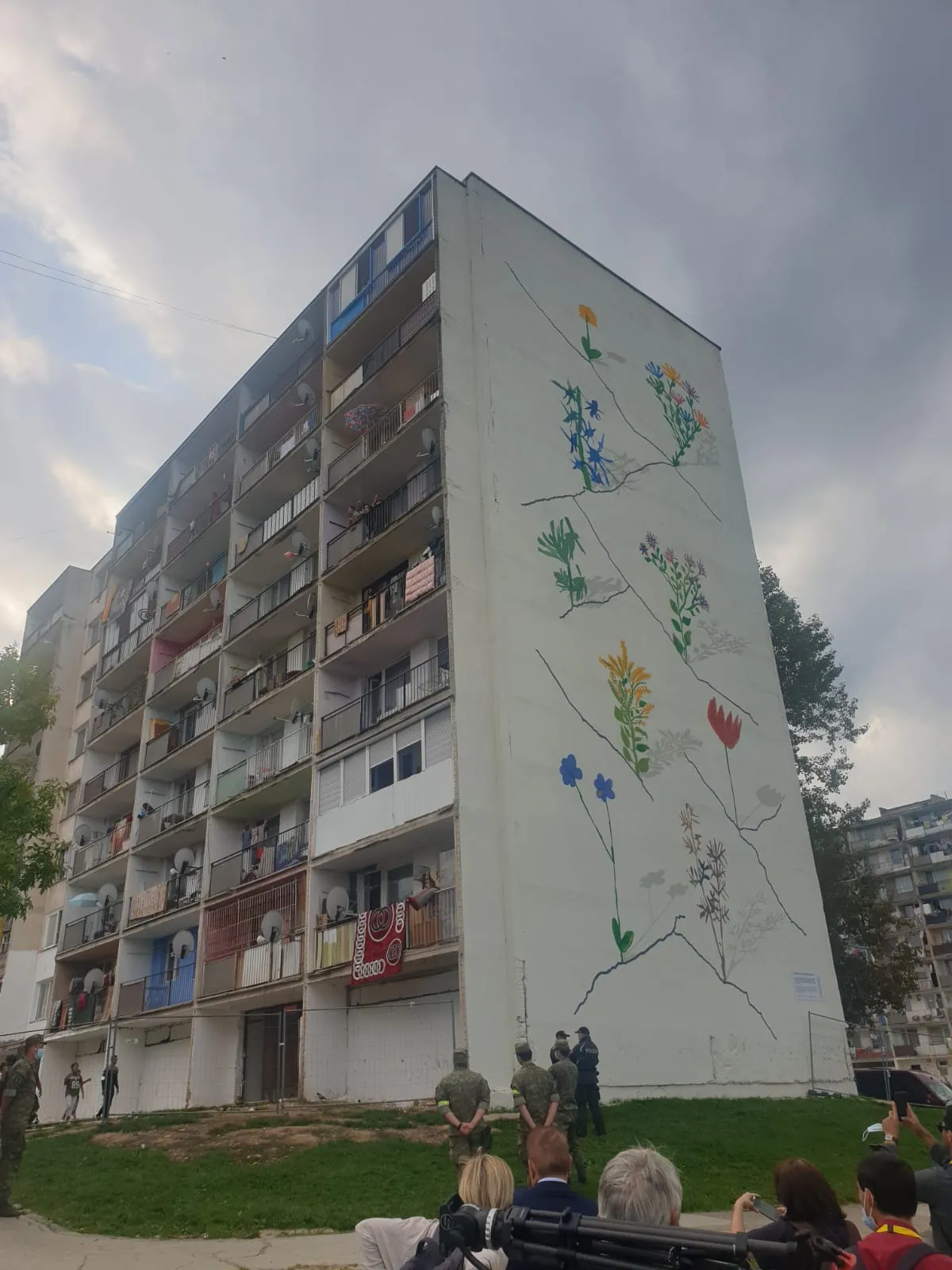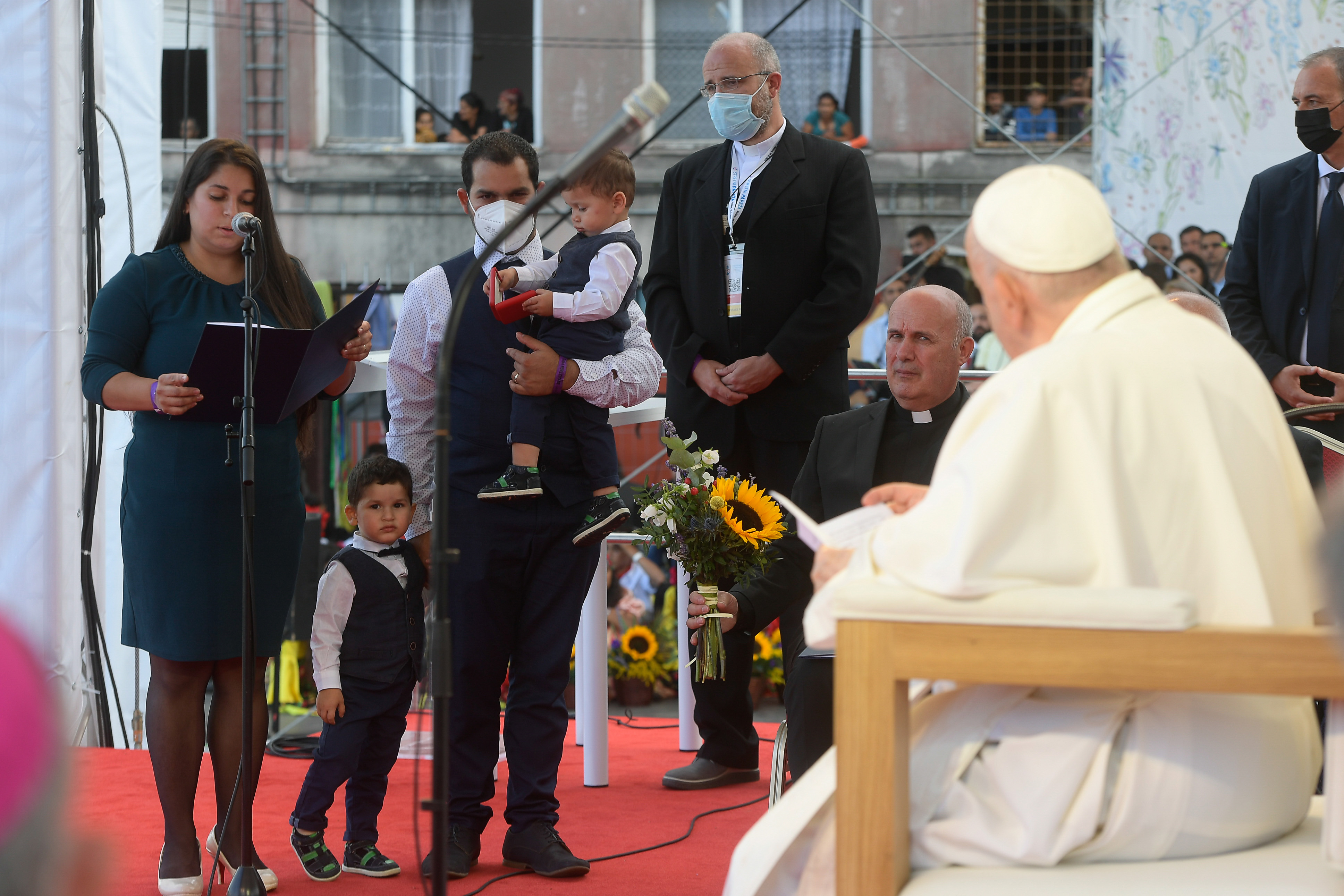
Rome Newsroom, Sep 14, 2021 / 09:30 am (CNA).
Pope Francis on Tuesday visited a ghetto in Slovakia to speak to the country’s marginalized and impoverished Roma minority.
During the Sept. 14 meeting, he told the Roma people, also known as Romani, that the Catholic Church is their home and they should never “worry about whether you will be at home there.”
“Nobody ought ever keep you or anyone else away from the Church,” the pope emphasized, as he addressed Roma from throughout Slovakia.
The gathering took place in the Lunik IX district in the Slovak city of Košice, where an estimated 7,500 Roma people live in buildings built to hold 2,500.
Housing is in a state of degradation, with no working gas, electricity, or other services. The community is nearly all unemployed and the close living quarters have led to the spread of disease and other health problems.

During the encounter with Pope Francis, the Roma from Lunik IX were required to stay inside or around the buildings, which police had roped off. About 300 Roma from other parts of Slovakia and other visitors were in seats facing the platform from which the pope spoke, according to information learned by journalists present at the event.
Košice spokesman Vladimir Fabian said residents of Lunik IX who did not register for the event either online or through paper registration were told to stay in nearby buildings for security reasons.
Roma first arrived in the district of Lunik IX in 1979, after their village next to a landfill was destroyed. By the mid-1980s, Roma made up half the population of the neighborhood, which they now entirely occupy.
Salesian priests and sisters moved into the area in 2008 to serve the poor ethnic minority, which has been the subject of prejudice for centuries.
Pope Francis arrived at the Sept. 14 visit to lively music, dancing, applause, and cheers. In his address, he spoke about Jesus’ words in the Gospel of Matthew: “Do not judge.”
“The Gospel must not be sweetened up or watered down. Do not judge, Christ tells us,” he said. “How often are our judgements really prejudices, pre-judgements? How often do we rest content with labels. In this way, we disfigure by our words the beauty of the children of God, who are our brothers and sisters.”
“Our knowledge and appreciation of others,” he added, “must be grounded in our acknowledgement that each of them possesses the inviolable beauty of a son or daughter of God, a reflection of the Creator’s image.”
In the Lunik IX district, the Salesian community consecrated a Catholic Church, the Church of the Risen Christ, in 2010, and since 2012 have operated a youth center. The Catholic sisters run a center for women and a kindergarten.
In a video the Salesians published earlier this month about their work in the district, Fr. Peter Bešenyei said their service in the community is “always about relationships. Once a relationship is established, mutual prejudices are broken down.”
“We Salesians offer immediacy, friendship. Simply, as people, we enter the Roma community,” Bešenyei continued. “Many people ask us: ‘How can we help you?’ I always answer: ‘Come and join us for Sunday Mass.’ The more we isolate ourselves, the more tensions and prejudices will grow. On the contrary, the more we live common positive experiences, the closer we will get.”
Pope Francis said: “Dear brothers and sisters, all too often you have been the object of prejudice and harsh judgements, discriminatory stereotypes, defamatory words and gestures. As a result, we are all poorer, poorer in humanity.”
“Restoring dignity means passing from prejudice to dialogue, from introspection to integration,” he continued, explaining that this can be carried out through concern, pastoral care, patience, and concrete efforts. “All these things will bear fruit,” he underlined. “Not immediately, but in due time those fruits will be seen.”
Košice, with a population of around 240,000, is the second largest city in Slovakia after the capital of Bratislava. It is the largest city on the country’s less-developed eastern side.
A new mural was created for Pope Francis’ visit to the Lunik IX district depicting flowers growing from the cracks of a building. The design of the mural was created in collaboration with local Roma children and funded by the city of Košice.

Mayor Jaroslav Polaček told local media the city of Košice also funded some repairs in the neighborhood prior to the pope’s visit, “so that we are not ashamed of the city quarter because many visitors will come here,” adding that “other special requests, which came directly from the Vatican,” were not completed however.
“It is not easy to leave prejudice behind, even for Christians,” the pope said in Lunik. “It is not easy to value others, especially if we see them as problems or enemies; if we pass judgment without making any effort to get to know them and to listen to their stories.”
“Marginalizing others accomplishes nothing. Segregating ourselves and other people eventually leads to anger,” he stated.
“The path to peaceful coexistence is integration: an organic, gradual and vital process that starts with coming to know one another, then patiently grows, keeping its gaze fixed on the future. And what is the future? It is our children. The future belongs to them; they are the ones to guide us: their great dreams must not collide with barriers that we have erected.”
“Courageous decisions must be made on behalf of our children: to promote their dignity, to educate them in such a way that they can grow up solidly grounded in their own identity and be given every opportunity they desire.”
At the beginning of the encounter, Pope Francis listened to two short testimonies from Roma.
The 61-year-old Ján Hero, a father of five with his wife, Beáta, who is Slovak, recalled visiting Rome six years ago with other Roma for a meeting with Pope Francis.
“We have the hope that your mission here today, among us, in this place will help us to ignite a greater faith and a more stable determination to transform our personal and spiritual life towards the better,” he said.
René Harakaly, 29, grew up in the Lunik IX neighborhood along with her husband Nikola. She said thanks to the help of the Catholic Church and the Salesians, they lived their adolescence “in a more beautiful and meaningful way.”
“[The Salesians] dedicated themselves to us, they trusted us, and this has influenced our desire for education, even though this was often difficult,” she said. “Our parents also encouraged us to go against the grain.”
Harakaly said she and her husband received the sacraments from the Salesians, who also baptized their two young children, and with their support, have managed to move to a new part of the city to better integrate into Slovakian society.

Fr. Bešenyei, who is the director of the diocesan center for the Roma mission in Košice, told Pope Francis “the Catholic Church is very committed to the Roma, even if by the State this commitment of the Church is ignored and not appreciated.”
“Holy Father, we believe that his presence in this place contributes to us all achieving greater unity despite diversity and walking the path towards a more peaceful coexistence, through mutual esteem, reconciliation and forgiveness,” he said.
Pope Francis concluded the meeting by leading everyone in praying the Our Father.
“I ask all of you to overcome your fears and to leave behind past injuries, confidently, step by step: in honest work, in the dignity born of earning our daily bread, in fostering mutual trust and in praying for one another,” he said. “That is what guides our steps and gives us strength. I encourage you, I bless you and I bring you the embrace of the whole Church.”
If you value the news and views Catholic World Report provides, please consider donating to support our efforts. Your contribution will help us continue to make CWR available to all readers worldwide for free, without a subscription. Thank you for your generosity!
Click here for more information on donating to CWR. Click here to sign up for our newsletter.





Leave a Reply